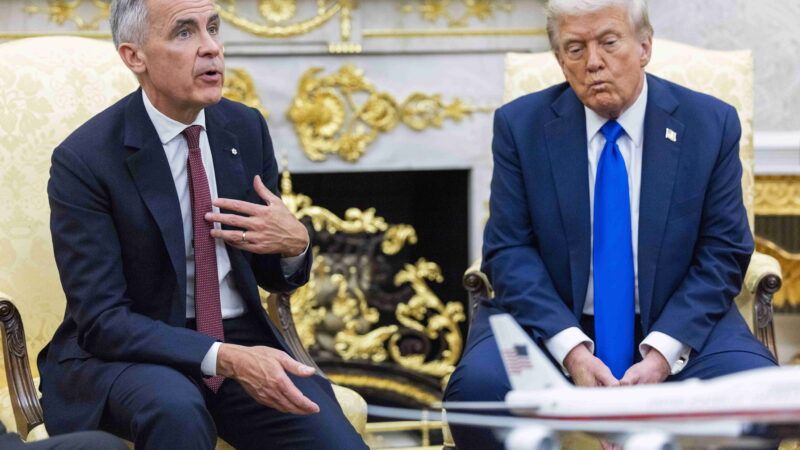Trump's Tariff Tantrum Proves He Shouldn't Have That Power
The Supreme Court is set to hear arguments in November on whether Trump's use of tariffs is constitutional.

President Donald Trump imposed tariffs on nearly every other country earlier this year, seemingly based on little more than his own misunderstanding of how trade works. Officials in the U.S. and Canada recently engaged in negotiations aimed at potentially reducing those rates—until Trump, in a fit of pique, terminated the talks and raised rates further.
As the Supreme Court is set to hear arguments about whether Trump's actions are constitutional, this scenario perfectly illustrates why a president should not have this power.
The government of Ontario started airing a commercial last week that featured audio from a 1987 radio address by then-President Ronald Reagan. "High tariffs inevitably lead to retaliation by foreign countries and the triggering of fierce trade wars," Reagan said, presciently. "Then the worst happens: Markets shrink and collapse; businesses and industries shut down; and millions of people lose their jobs."
Trump took such offense at the ad that he cut off talks with Canada. Ontario agreed to pull the ad from the air this week, but when it aired again Friday night during Game 1 of the World Series, Trump said he would raise tariffs on Canada even further.
"Canada was caught, red handed, putting up a fraudulent advertisement on Ronald Reagan's Speech on Tariffs," Trump posted on Truth Social. "Because of their serious misrepresentation of the facts, and hostile act, I am increasing the Tariff on Canada by 10% over and above what they are paying now."
"They cheated on a commercial," Trump told reporters. "Ronald Reagan loved tariffs, and they said he didn't. And I guess it was AI or something."
To be clear, the ad was neither "fraudulent" nor AI. "The commercial in fact used very standard editing, with nothing deceptive that distorted the meaning," points out Reason's Liz Wolfe. "All the words were from Reagan's 1987 speech condemning protectionism and advocating free trade."
Reagan did impose tariffs and import quotas on certain products during his term, but it seems like a stretch to say he "loved tariffs" considering how warmly he spoke of free trade. In fact, in the radio address which the Ontario ad excerpted, Reagan said that even though he had placed 100 percent duties on electronics from Japan, "imposing such tariffs or trade barriers and restrictions of any kind are steps that I am loath to take."
"Our trade policy rests firmly on the foundation of free and open markets," Reagan said in 1985. "I…recognize the inescapable conclusion that all of history has taught: The freer the flow of world trade, the stronger the tides for human progress and peace among nations."
Even if the ad were completely false, of course, it would be ridiculous to respond to it by hiking duties on Canadian imports and thus raising prices for Americans. But since Trump found the ad personally insulting, he did exactly that. "To be clear, a TV commercial is about to cost American consumers about $50 [billion] because he's mad," posted Flavio Volpe, president of the Automotive Parts Manufacturers' Association, a Canadian auto industry group.
This encapsulates a simple truth: No single person should have the unitary authority to impose tariffs on other countries.
The Founders clearly agreed. Article I, Section 8 of the U.S. Constitution explicitly delegates "Power To lay and collect Taxes, Duties, Imposts and Excises" not to the president, but to Congress. Today, that would mean a majority of 535 lawmakers, instead of a single mercurial individual, must agree to impose or remove tariffs.
Congress delegated many of its constitutional authorities to the president over the course of the 20th century. The 1977 International Emergency Economic Powers Act (IEEPA) gives the president a number of economic powers "to deal with any unusual and extraordinary threat…to the national security, foreign policy, or economy of the United States, if the President declares a national emergency with respect to such threat." Even so, IEEPA never mentioned tariffs, and yet Trump cited the statute to impose tariffs on dozens of other countries, implausibly claiming persistent trade deficits constitute national emergencies.
In November, the U.S. Supreme Court is scheduled to hear arguments in a case brought by small businesses, arguing Trump's use of IEEPA to impose tariffs is unconstitutional. Several organizations, including the Cato Institute, the National Taxpayers Union Foundation (NTUF), and the U.S. Chamber of Commerce, have submitted amicus briefs in support of the plaintiffs.
"IEEPA contains no reference to 'tariffs' or 'duties,' and no President had
cited it to impose tariffs in the nearly 50 years since its enactment—until now," the Cato filing argues. "The government's reading of IEEPA not only stretches the text beyond recognition but also undermines the Framers' designs for the separation of powers."
"The boundless authority the government claims under IEEPA would amount to an unconstitutional delegation of Congress's legislative power to the Executive," adds the Chamber of Commerce.
"IEEPA invocations have been to sanction, embargo, or freeze assets of foreign governments, terrorist organizations, or hostile nationals as part of foreign policy emergencies," argues NTUF. "That the statute specifically authorizes restrictions on importing and exporting currency or securities, and otherwise freezing or confiscating foreign property, suggests that broad sweeping tariffs on all goods and services are beyond the statute's scope."
These arguments are right about the unconstitutionality of Trump's tariffs. Trump's actions over the past week also provide a practical argument for why the Founders were right not to give that power to a single person.
